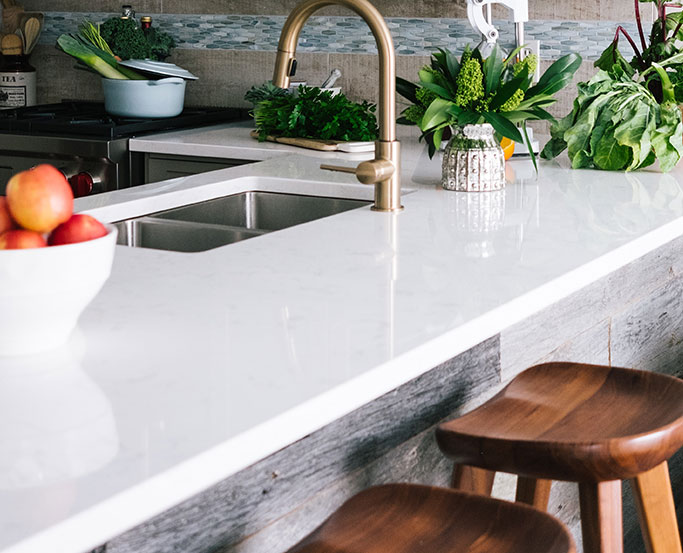Thinking of installing a brand new kitchen countertop? The good news is that there’s a myriad of choices in terms of materials, ranging from inexpensive to quite expensive. The bad news is that all of these choices can seem overwhelming.
Below are a few key reasons why you should consider engineered stone (often called quartz) as your go-to material for your kitchen countertop:
-
Stain-Resistant Properties
Whereas natural stone tends to absorb spills from oil, grease, and juice, engineered stone does not. Engineered stone is stain resistant which will keep it looking great for years and years to come. This property is quite important since you’ll likely be using your kitchen countertop for food preparation and spills, no matter how hard we may try to avoid them, will inevitably happen at one point or another.
The reason why engineered stone is able to resist spills and stains is that it is not fully natural stone. The resin binder product used in its manufacture creates an impermeable barrier that repels spills of all sorts.
-
Ageing and Durability
Another important quality of engineered stone that puts it a cut above the other materials is that it ages superbly. Natural stone such as granite may be technically harder than engineered stone, but it will wear out much faster as materials such as granite are prone to cracking and wear and tear since they lack a sealant.
Engineered stone, on the other hand, is far more resilient and will not crack as easily. Scratches and scuffs are also not much of a problem, although you may wish to avoid cutting directly atop the surface and to use a cutting board instead. When used as a kitchen countertop, it’ll last for many, many years provided that it’s well-maintained and cleaned frequently.
-
Easy to Maintain
As mentioned, engineered stone countertops are non-porous since they are made of real, natural stone filled in with a resin binder. This means that no liquids or bacteria can accumulate inside of the countertop and lead to mould or any other unhygienic situations.
A simple spray and wipe will keep the countertop looking great and free of food crumbs or spills. This is much better than natural stone, which is porous and can be highly problematic to clean if bacteria is allowed to spread freely inside the stone.
-
Affordable Alternative to All-Natural Stone
For all of its benefits, you may be led into thinking that engineered stone is far more expensive than natural stone. In most cases, it’s actually more affordable than natural stone.
One of the reasons is that natural stone countertops need to be fine, high-quality cuts of stone, whereas engineered stone doesn’t need to be perfect since it will be finished with a resin binder. Moreover, natural stone tends to be more costly in the long run since it will likely wear out sooner and can be damaged more easily than engineered stone.
-
Endlessly Versatile
One good case to make for natural stone countertops is that there are plenty of beautiful natural stone surfaces and textures that can bring out any kitchen’s aesthetic. Well, if that can be said for natural stone, the same can be said for engineered stone. Furthermore, engineered stone can be filled with custom colours and textures in the resin binder, creating unique finishes that are as versatile as your imagination. This includes replicating fully natural stone finishes to using tints, colours, and textures that are completely bespoke.
Stone Benchtop Connection
Find your next kitchen countertop at Stone Benchtop Connection.




